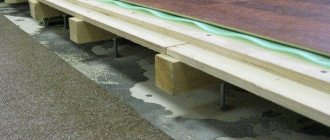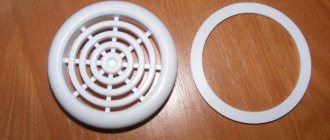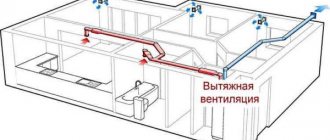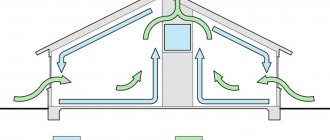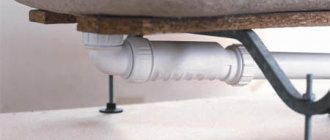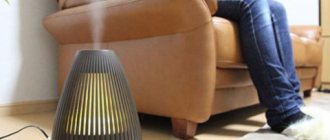Stuffiness - an unpleasant, but at the same time common phenomenon for urban housing owners. For what reasons does the room become stuffy? Why doesn't ventilation help in the summer heat? What to do if it’s stuffy in the apartment?
Everything is relative. If you compare a modern apartment and a rustic log house with the “conveniences” on the street, the first may seem like a real communal paradise. However, the owner of a log house could hardly spend at least a week in an ordinary 9-story panel apartment. He simply wouldn’t be able to breathe in it, there wouldn’t be enough fresh and clean air.
The habit of city dwellers to endure stuffiness can create many problems. It leads to constant fatigue, long periods of falling asleep, poor sleep and headaches in the morning.
There are several reasons why stuffiness is created in the house - both in winter and in summer.
Why is the room stuffy?
The room is stuffy due to excess carbon dioxide. When we breathe, we take in oxygen and exhale carbon dioxide. The longer we stay in an unventilated room, the more carbon dioxide in the air and the less oxygen. And the more people in the room, the faster the concentration of carbon dioxide increases.
There may be enough oxygen in the room, but this will not help. If the concentration of carbon dioxide is high, the person will feel unwell.
A high concentration of carbon dioxide is also the answer to the question of why the room is stuffy in the morning, even if the room is ventilated before going to bed. If you sleep with the windows closed because there is heat, cold, dust or noise coming from the street, then you will sleep in a stuffy room.
Is lowering the air temperature the solution to the problem?
The air may be dry and cool, but it is still not fresh, and therefore bad for health. In a closed, unventilated room, carbon dioxide gradually accumulates and poisons the human body.
The carbon dioxide content in the air outside is 0.04%. This indicator is natural for humans. In a room that is deprived of fresh air, 2 people will increase the concentration of CO2 in the air to 0.2%. This figure is 5 times higher than the optimal one. With such indicators, the brain suffers first of all, since it begins to feed not on oxygen, but on carbon dioxide. A person begins to think poorly and do his job worse. Problems start at 0.1% - this is the maximum allowable value for indoor spaces, according to WHO recommendations.
The main component of stuffiness is poor quality air. It stalks people in most enclosed spaces. Unlike temperature and humidity, a person may not immediately feel that the CO2 level has been exceeded. The body panics only after several hours, which manifests itself as migraine, apathy, and sleepiness. An increased concentration of carbon dioxide has a negative effect on human DNA, the nasopharynx and respiratory organs: asthma attacks intensify, blood circulation worsens and brain activity decreases.
Unfortunately, neither an air conditioner nor a fan can cope with this threat; they only mask it, which has a negative impact on the human body.
Consequences of stuffiness
Carbon dioxide levels are measured in special units - ppm. The normal ppm value for the street is 350-400 ppm. At 800-1000, problems with well-being begin. This concentration is achieved when three people are in an unventilated room for one hour. If they sit there for two hours, the concentration will reach 3000 ppm.
If you stay in such conditions for a long time, prepare for the consequences:
- headache;
- dizziness;
- decreased concentration;
- poor performance;
- fatigue;
- apathy;
- heavy breathing and shortness of breath;
- increased asthma attacks;
- blood oxidation - acidosis;
- fainting.
People try to get rid of stuffiness in different ways. Someone turns on the air conditioner, someone opens the windows. Let's look at why these methods are ineffective.
Stress is to blame
Usually during difficult situations a person sweats a lot. This is a natural reaction to external stimuli: as anxiety increases, the level of adrenaline increases, which causes the heart rate to accelerate and the apocrine glands, which produce sweat, to activate.
With more prolonged stress, a person may feel intense heat. The fact is that during the “fight-flight-freeze” reaction, blood pressure rises, blood flows faster, filling large muscles so that a person can protect himself from threats, which causes body temperature to increase.
Why air conditioning doesn't help?
The air conditioner cools the air in the room. It does not draw in air from the street and does not release it outside.
Using air conditioning is even dangerous: it creates a false sense of a comfortable atmosphere in the room. Cool air makes you think the room is fresh when in fact it is not.
If you sit indoors for a long time with the air conditioner running, carbon dioxide will accumulate and your health will worsen.
It's about menopause
During the period of hormonal changes, the work of the hypothalamus, the part of the brain responsible for reproductive function and thermoregulation, changes. This happens because the body adapts to the lack of estrogen. At this time, a woman may experience either fever or chills - this is called hot flashes. They go away on their own within 4–5 years as a woman goes through menopause. If changes in temperature bother you, you should discuss this with your gynecologist - he can suggest remedies that will reduce discomfort.
How to deal with stuffiness
The answer is simple - provide a flow of fresh air. Cleaning it is also important: it is desirable that dust, soot and allergens do not enter the room.
The solution to the problem is to install ventilation that purifies the air. An example of such ventilation is supply and exhaust ventilation.
Her work is similar to human breathing. First, the system inhales: it takes air from the street. The air passes through filters that trap dust, dirt and allergens. Exhaust system: the hood takes air from the room and removes it outside. The duration of each inhalation and exhalation is 40 seconds. This way, fresh, purified air constantly enters the room, and carbon dioxide comes out.
Using a smart hood, you will not catch a cold due to the influx of cold air in winter and will not overheat due to hot air in summer, since the system cools warm air and heats cold air. In both cases, fresh air enters the room without the need to open a window and introduce dust, noise and unpleasant odors.
How to reduce body temperature
While you're trying to escape the heat without air conditioning, it's important to not only cool the room, but also your body. If you do nothing, the stuffiness may cause you to suffer from heatstroke.
In order not to encounter unpleasant symptoms of this disease, you need to follow a few simple rules.
Reduce activity
On a stuffy and sunny day, try to reduce your activity. Postpone all activities that involve a large amount of physical activity until another day. If possible, then at least for the evening.
Keep your head cool
Pexels
If you feel tired and unwell, immediately wrap two wet, cool towels around your neck and head. It is better to use this method throughout the day until the heat subsides.
Take cool showers periodically. It will make staying in the apartment easier, at least for a while. They just seem to be careful with drafts.
Drink more fluids
On warm summer days, it is important to avoid dehydration. To prevent this from happening, drink more fluids.
Unsplash
However, do not overuse iced drinks, as they can cause a cold or sore throat. Let it be room temperature water or cold green tea. It quenches thirst well and tones up.
But you will have to give up coffee and alcohol. Both drinks promote fluid removal, which means they lead to poor health and dehydration.
Save a bottle of water for the night and place it on your bedside table. This way you will replenish your water supply even while you sleep.
- Accessories
On guard of healthy habits: 7 home accessories that will help you drink more water
Choose the right products
Pixabay
In hot weather, we advise you to avoid fatty foods and fish. Try to eat more watery fruits and vegetables.
Cut the fruit into small pieces, place in special molds, fill with juice and place in the freezer for several hours. You will receive delicious and refreshing homemade ice cream.
- Vacation home
10 proven ways to escape the heat at the dacha
Let's sum it up
To keep the room from being stuffy, use new generation ventilation. It provides a flow of fresh air, but does not let dirt and allergens in. This way the room will be clean, and allergy sufferers will not suffer from dust and pollen.
Also, a modern hood releases carbon dioxide into the street, so it fights the stuffiness that appears due to excess carbon dioxide in the room.
To order supply and exhaust ventilation VAKIO or find out more about it, call 8 800 707 0332, order a call or write to us
How to cool an apartment: unusual ways
Many people are used to pointing the turned on fan towards themselves, but few people know that this is wrong. It is necessary that it blows cold air onto the furniture, and that, in turn, can absorb the heat emanating from other interior items. To keep it cooler, you can place bottles of ice and cold water in front of the fan.
You can use other options that you don’t often see in normal times:
- Place buckwheat in the pillow - experts say that such an unusual method allows it to retain heat less well;
- Do not sleep on the bed - you can put the mattress on the floor and immerse yourself in the arms of Morpheus, since it is much cooler downstairs;
- Don't drink cold water - Many people try to cool themselves down by drinking cold water. This is incorrect, as the body will quickly heat up as it tries to replenish lost heat. Therefore, no matter how surprising it may be, it is better to drink tea.
Comments
Have problems with the thyroid gland
If a person is constantly tired and feels hot all the time, it may be due to hyperthyroidism, a syndrome in which the thyroid gland produces more thyroxine and triiodothyronine than the body needs. Excess hormones lead not only to overheating, but also to severe weight gain, tachycardia, and menstrual irregularities.
Problems related to the thyroid gland should be diagnosed by an endocrinologist. He will prescribe the necessary tests, help adjust your diet, which will remove excess stress from the nervous and cardiovascular systems and, as a result, restore hormonal balance, and also select a treatment regimen.
Have a lot of coffee in your diet
Experts have long debated the effect of coffee on the thermoregulation system. Back in 1990, Danish scientists concluded that the drink affects the heart rate and increases overall body temperature. These data were partially confirmed by specialists from the Mayo Clinic in 2015. They found that coffee can worsen the condition of women during menopause by increasing hot flashes.
Usually, constant sweating and a feeling of stuffiness occur with prolonged and frequent drinking of the drink - at least 3 cups a day. If you have no health problems, but the fever does not go away, try drinking less coffee for at least 2 weeks.
Worth getting checked for diabetes
The North American Center for Disease Control and Prevention reminds that people with prediabetes often experience feelings of fever.
Their pancreas produces insulin, a hormone that helps digest carbohydrates, less and less every day. Because of this, blood sugar levels fluctuate more than in people without a predisposition to diabetes. Carbohydrate surges include the “fight-flight-freeze” reaction - and this, as we have already found out, provokes the release of adrenaline and additional stress on the circulatory system. Diabetes or a predisposition to it can also be identified by slow wound healing, sudden weight loss or weight gain, as well as constant hunger and abnormal thirst.



